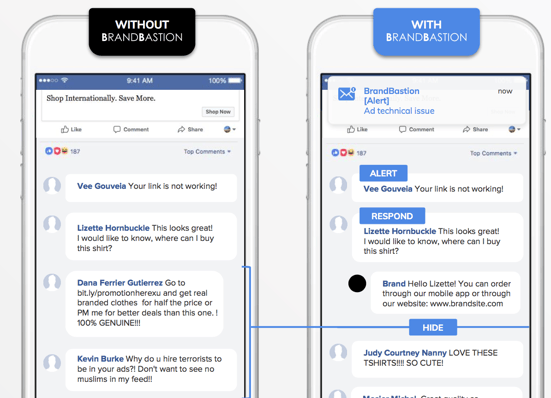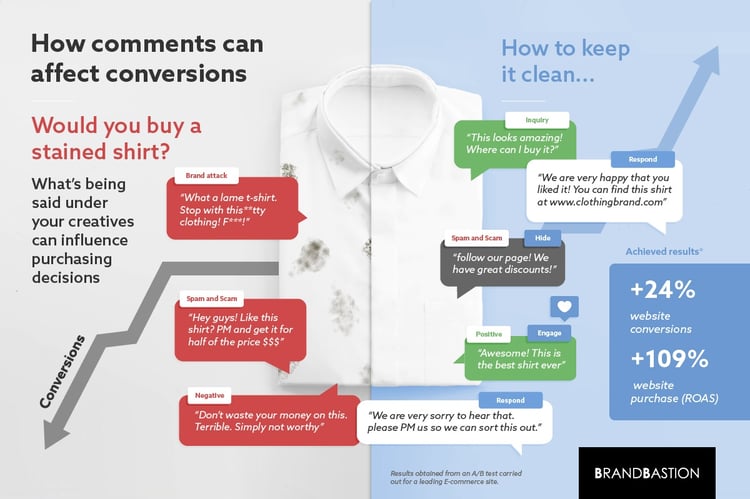
How Comments Can Affect Conversions on Social Media
It is well established that reviews left under products on eCommerce sites can have a significant impact on conversion rates. Research shows that up to 84% of people trust online reviews as much as personal recommendations.
However, as the focus for marketing efforts has swung heavily to social media spaces (Facebooks's ad revenue in 2017 hit 39.9 billion USD), a new factor has come into play. Comment feeds are placed directly beneath, or adjacent to, both organic and paid content placed by brands. Similar to graffiti left on a billboard, members of the public can now contribute material which will inevitably be seen by the majority of the content viewers.
Taking the time to look into what is being said next to your creatives may give a better insight into the performance. For a run down of what comments to look out for, and how to manage them optimally, let's take the example of promoting a shirt online.
(Speaking of shirts, check out our latest study on marketing apparel on Instagram here)
Positive comments
e.g. "This shirt looks über comfy!"
Are you receiving positive comments on your creative? Fantastic. Contented customers and followers can help encourage other buyers who are teetering on the edge of a purchase decision. Much in the same way as reviews, wary consumers can often relate better to genuine comments than to carefully crafted PR from a company or brand.
What should you do? Engage and highlight. Responding to and liking a positive comment can help draw attention to it and lead to it taking up more real estate in the feed. Doing so can also increase brand loyalty from the commenter, and encourage similar comments from other posters.
e.g. "Hey @user, we're glad you like it!"
Queries
e.g. "Can I order this in Canada?"
For the social media generation, attention spans are hitting an all time low. Casual scrollers, even if they have taken the time to comment a question on one of your ads, will have moved on to other thoughts with a few flicks of the thumb. Responding to their queries is your opportunity to gain back their attention, and make a sale.
The issue is, queries and questions on paid content comment feeds are excruciatingly difficult to access. This means that a huge portion of potential customers reaching out for more info often go unanswered. The negative aspects of this are clear. Imagine walking into a shop, asking what material a shirt on the rack is made out of and being met with blank stares and silence.
Any chance to make a purchase more convenient is an absolute priority in comment management. Any response rate lower than 100% is missing out on opportunities for conversions.
In order to make responses more efficient and convenient, consumers can be guided to specific landing pages based on the subject of their query.
e.g. "Hey @user, find out more about our delivery locations at brand.com/deliveryoptions"
Negative comments
e.g. "This shirt is s**t, it didn't fit at all"
Negative comments can be dealt with to manage their impact on sales. Responding to a comment with a helpful resolution can show others that your brand has an active customer service team. Encouraging them to move the conversation to private messaging (DMs or email) can stop further negative comments appearing, both from the original commenter and other consumers looking for a resolution to similar issues.
e.g. "Sorry to hear that @user. Please send us a message at support@brand.com so we can get this sorted a.s.a.p."
If the comment is an all-out and unfair attack on the brand, peppered with profanity, Facebook and Instagram also offer options for hiding/removing comments. When necessary, doing this promptly can limit the amount of impressions from other viewers.
When it comes to your Facebook ads that may be reaching millions of people, you can also choose to both hide a highly negative comment AND respond to it. This way the end customer is getting the service and assistance they need, but the whole target audience doesn't need to be dragged through the entire conversation.
Hate speech
e.g. "What's with the fat model wearing that shirt. Whales like that shouldn't be wearing tight shirts"
Unfortunately, the internet can bring out the worst in people. The anonymity provided by digital communication seems to encourage some to post particularly offensive comments online.
Displaying vulgar and hateful comments next to creatives can set a bad impression for prospective buyers. In circumstances where comments are way out of line with the values of the brand, quick action should be taken to remove or hide the comments.
Unfortunately, this hate speech isn't always sprayed out aimlessly into the ether. Harassment and bullying are common place in comment sections.
e.g. User A; "I would love to buy this shirt :)"
User B; "WOW with your body type you should be choosing big sweaters and not slim fit shirts"
Hiding these kind of comments is extremely important to maintain a welcoming and positive community, born out of a connection with your products. Protecting your followers from bullying not only helps to keep their business with your brand, but is also morally the right thing to do.
Reacting fast is important, as things can escalate quickly. Monitoring comments on Facebook and Instagram ads, especially if you have many ads running at scale, is a very challenging (if not, at times, impossible) task to do through Facebook's native tools. Use of a comment management solution like BrandBastion's, with real-time moderation 24/7, can make a headache such as this far more manageable.
Spam and scams
e.g. "Identical shirts for sale here at less than half the price 💰💰💰 💯 💯 💯 --> counterfeits.com"
Open comment feeds unfortunately allow for spam and scams to be posted. Whether they are trying to piggy back on your ad spend and promote their own goods, or if they are just trying to lead your followers to malicious links, they can lead to lost conversions.
Any sort of comment of this nature should be removed or hidden before it has any chance to cause harm to readers or simply steal away their business. Read more about how Adidas is working to deal with counterfeit sellers here.
How to manage comments at scale
Making sure comments are actively managed, at scale, across all of your paid and organic content, can be a time consuming, frustrating and expensive endeavor, especially with dynamic ads involved (see our Facebook Advertising Guide on How to Manage Comments on Dynamic Ads). Solutions such as BrandBastion's exist to consolidate and optimize this process.
Through our AI-based technology, BrandBastion offers brands the chance to carry out all the suggestions denoted above, without putting a strain on HR budgets, or customer services team's workloads.

Briefly put, our solution provides:
- Real-time moderation in 43 languages, 24/7
- Instant alerts to crises or negative sentiment trends
- Automated AI responses combined with trained human content analysts
- Qualitative sentiment reports
Through these actions, we can help drive better conversion rates on both organic and paid content.

